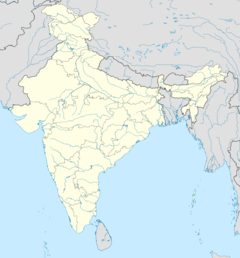This article needs additional citations for verification. (September 2019) |
Hazarduari Palace, earlier known as the Bara Kothi,[1] is located in the campus of Kila Nizamat in Murshidabad, in the Indian state of West Bengal. It is situated near the bank of river Ganges. It was built by Nawab Nazim Humayun Jah in the nineteenth century. He was the Nawab of Bengal, Bihar and Orissa (1824–1838).
| Hazarduari Palace | |
|---|---|
 The grand palace of Hazarduari illuminated at night | |
| Former names | Bara Kothi |
| Alternative names | Nizamat Kila |
| General information | |
| Architectural style | Italian-style palace built in the 19th century and Greek (Doric) style |
| Location | Murshidabad district |
| Country | |
| Coordinates | 24°11′11″N 88°16′07″E / 24.1864°N 88.2687°E |
| Groundbreaking | 9 August 1829 |
| Completed | December, 1837 |
| Cost | 16.50 Lacs Gold Coins. |
| Owner | Archaeological Survey of India |
| Height | 80 feet |
| Dimensions | |
| Other dimensions | Length: 130 meters and Breadth:61 meters |
| Technical details | |
| Floor count | 3 |
| Design and construction | |
| Architect(s) | Colonel Duncan MacLeod |
| Other information | |
| Parking | available |
In 1985, the palace was handed over to the Archaeological Survey of India for better preservation.[2][3]
According to the Archaeological Survey of India as mentioned in the List of Monuments of National Importance in West Bengal, the Hazarduari Palace and Imambara are ASI Listed Monuments.[4]
Kila Nizamat
editKila Nizamat or Nizamat Kila or Nizamat Imambara(Nizamat Fort) was the site of the old fort of Murshidabad. It was located on the present site of the Hazarduari Palace, on the banks of the Bhagirathi river.[5]
Etymology
editThe name of the palace that is Hazarduari, in which Hazar means "thousand" and Duari means "the one with doors"; thus, the total sums up to "the one with a thousand doors".
The palace earlier known as Bara Kothi has been named so as the palace has in all 1000 doors, of which 100 are false. They were built so that if any thief or robber tried to steal something and escape, he would be confused between the false and real doors and by that time he would be caught by the Nawab's guards.[6]
Museum
editThe palace has now been transformed into a museum which houses collections from the Nawabs like priceless paintings, furniture, antiques and so on. The famous one is the mirror and the chandelier. In 1985, the palace was handed over to the Archaeological Survey of India for better preservation.[2][3]
Miniature
editA miniature of the palace,[7] made by Sagore Mistri in ivory, along with portraits of His Highness and his son, among other presents, were sent to King William IV. He honoured the Nawab with a full-size portrait of His Majesty and an autographed letter, and conferred upon him the badge and insignia of the Royal Guelphic and Hanoverian order, which are still preserved in the Palace.
Map
editGallery
edit-
Hazarduari Palace
-
Complex Garden
-
Hazarduari Palace from Backside
-
Photos from Hazarduari Palace with the palace's chandelier in the center. This chandelier is the second largest in the world after that in the Buckingham Palace
See also
editReferences
edit- ^ "History of Murshidabad". Archived from the original on 10 June 2016. Retrieved 28 March 2012.
- ^ a b "Palace handed ovet to ASI". Archived from the original on 24 September 2015. Retrieved 28 March 2012.
- ^ a b "Handed over to ASI". Archived from the original on 7 May 2012. Retrieved 28 March 2012.
- ^ "List of Ancient Monuments and Archaeological Sites and Remains of West Bengal - Archaeological Survey of India". Item no. 122. ASI. Retrieved 18 July 2021.
- ^ "Nizamat Kila". Archived from the original on 30 July 2012. Retrieved 30 March 2012.
- ^ "Hazarduari Palace". Archived from the original on 23 December 2012. Retrieved 28 March 2012.
- ^ Palace's miniature Archived January 6, 2012, at the Wayback Machine
External links
edit- Hazarduari Palace travel guide from Wikivoyage
- "Wonders of India: Hazarduari Palace" on YouTube

